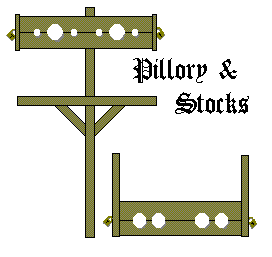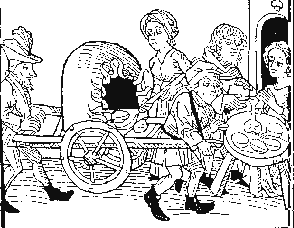Curmudgeon's Cookery - Punishment
![]()
Piers Plowman
To punish on pillories or on pining stools
Brewers, bakers, butchers, and cooks;
For these be the men on earth who do most harm
To the poor people who buy piece-meal.
They poison the people secretly and often…
William Langland 14th century
 Judicium
Pillorie. In "The Good Old Days.."
prisoners convicted of minor offenses were often placed on public display in a
pillory (an elevated platform restraining head and arms) or feet restraining stocks
(a variation was the iron "bilbo" fetter attached to a
post). A favorite amusement of juveniles at the time was throwing
rotten and putrid things at the offenders. Supplies of old eggs would be hoarded for these
special events!
Judicium
Pillorie. In "The Good Old Days.."
prisoners convicted of minor offenses were often placed on public display in a
pillory (an elevated platform restraining head and arms) or feet restraining stocks
(a variation was the iron "bilbo" fetter attached to a
post). A favorite amusement of juveniles at the time was throwing
rotten and putrid things at the offenders. Supplies of old eggs would be hoarded for these
special events!
Ill Eel. Charles Pedrill (London Life in the 14th century) reports that a cook who supplied a bad conger eel was heard by a jury of 12 neighbors, forced to refund the meal charges, and made to "stand on the pillory while the fish was burnt beneath him." For a more severe crime, the ears of the culprit could be nailed to the pillory frame...
Ducking Stool. Another punishment
was riding the "ducking stool." A chair was attached to the end of a
long pole. The pole was mounted on an axel with two wheels and could pivot. Sometimes the contraption
was mounted on three wheels so that the miscreant could be wheeled through the town
attended with public derision before he or she was dunked a set number of times in a dirty pond or
river.
There was a similar device known as a "gibbet" according to William
Andrew (England in the Days of Old). He describes its use: "If a
baker was found guilty of an offense against the law, he was arrested and kept
in safe custody till the gibbet was ready for him. It was erected as nearly as
possible in the middle of the town, the beam projecting over a stagnant pool; at
the end of the beam was a pulley, over which ran a rope fastened to a basket [or
cage] large enough to hold a man. The baker was forced into the basket, which
was drawn up to the beam; there he hung over the muddy pool, the butt of jeers
and missiles of a jubilant crowd. His only escape was to jump into the dirty
water and run through the crowd to his home . . ."
 Fish Crown. In old London,
authorities would catch a baker selling adulterated or short-weight bread,
hang a token loaf around his neck, and then drag him down the street in a public show of
punishment. In 1561 a woman caught "bryngyng younge frye of dyverse kynd
unlawful" (an early fish and game conservation law) was paraded around the town wearing a crown of tiny fish.
Sometimes the dead fish would be placed around the neck for those
undergoing "judicium pillorie" or forced to parade down the street. In
later years, when more people could read and write, a placard identifying the
sin was often substituted.
Fish Crown. In old London,
authorities would catch a baker selling adulterated or short-weight bread,
hang a token loaf around his neck, and then drag him down the street in a public show of
punishment. In 1561 a woman caught "bryngyng younge frye of dyverse kynd
unlawful" (an early fish and game conservation law) was paraded around the town wearing a crown of tiny fish.
Sometimes the dead fish would be placed around the neck for those
undergoing "judicium pillorie" or forced to parade down the street. In
later years, when more people could read and write, a placard identifying the
sin was often substituted.
Ear for a Loaf. In Turkey the punishment of a baker who did not provide full honest weight would have his ear nailed to his establishment's door post. "If he were out when the officers of justice arrived his son or his servant was punished in his stead, as the authorities were very much averse from making their men do the journey twice." [The account does not state if the baker was still attached to the ear when it was nailed to the door post …]
Death by Draft. In 1482 a seller of spirits at Biebrich on the Rhine was condemned to drink six quarts of his adulterated wine. He died.
Putrid Pigeon Punishment.. A John Russell at Billingsgate was punished for selling thirty seven pigeons that were "putrid, rotten, stinking and abominable." He was placed into a pillory and the pigeons were burnt beneath him.
"Bad Meat Sold Here." "British butchers convicted of selling meat unfit for human consumption may be required on a second offense to put up signs on their shops stating their record." 1891 (James Trager The Food Chronology) California has adopted a similar out-dated law of posting restaurant grade cards.
Blame Filthy Lucre. An early American law intended to control "..some evilly disposed persons, from motives of avarice and filthy lucre, have been induced to sell diseased, corrupted, contagious or unwholesome provisions, to the great nuisance of public health and peace… shall be punished by fine, imprisonment, standing in the pillory, and the binding to the good behaviour.." Signed into law March 8, 1785 by Massachusetts Governor Samuel Adams, who is better known today for a brand of ale.
 Mayor's Malefactor. Pedrill
writes:
".. a rule was made in 1392 that when any loaf from Stratford was found
deficient in weight the whole cartload should be confiscated. Raids were
frequently made upon these men by the officials, and on one occasion in 1387,
when the Mayor himself came to make an inspection, one of them hastily inserted
a piece of iron into a loaf to increase its weight, but was detected and
seized." The illustration is that of a medieval bread oven on wheels, a predecessor
of the modern "roach-coach" catering trucks that seem to infest
Southern California.
Mayor's Malefactor. Pedrill
writes:
".. a rule was made in 1392 that when any loaf from Stratford was found
deficient in weight the whole cartload should be confiscated. Raids were
frequently made upon these men by the officials, and on one occasion in 1387,
when the Mayor himself came to make an inspection, one of them hastily inserted
a piece of iron into a loaf to increase its weight, but was detected and
seized." The illustration is that of a medieval bread oven on wheels, a predecessor
of the modern "roach-coach" catering trucks that seem to infest
Southern California.
Food as Punishment. In some
societies horse meat is regarded as fine food. This attitude is not shared by
all. During sieges in the Middle Ages, starving people would catch and eat rats before
they would consider horse meat.
The Danes, according to a report by Robert Graves, ". . . made forcible eating
of horseflesh a deterrent to crime; by 1860, no other meat could be provided for
felons in gaol."
Can you imagine prisoners screaming:
"Anything but horse. Give me swill! Please, p-l-e-a-s-e give me swill!"...
Blue Milk. Adulteration of
milk was so common that recipes of the time would distinguish between ordinary
milk and "blue milk." With its baptism of water, some called it
"Christian milk."
William
Fishman (East End 1888) reports on fines from three pounds to one
shilling for the crime of milk adulteration. Other items "found diluted included
bread, flour, sugar, butter, oatmeal, coffee and cocoa…beer." Fishman shares
this cute ditty of the time:
Little drops of water added to the milk
Make the milkman's daughter clothe herself in silk.
Little grains of sand in the sugar mixed
Make the grocery man soon become well fixed.
Little acts of meanness, little tricks of trade,
All these pass for keenness, fortunes thus are made.
Blue Milk in America. Profiting from the poor was not just a practice in England. We share a similar American verse from about the same time period:
A quart of Milk, good man, I'll take
'Tis for my little dark-eye daughter,
But Tell me, sir, for her sweet sake
Ah! Tell me 'Tis not Milk and Water."
We will close this out with a bit of old humor.
"A milkman was lately seeking the aid of the police to trace the
whereabouts of a family who had left the neighborhood owing him eighteen
dollars. 'Well, I suppose there was nine dollars of water in that milk account'
remarked the policeman.'
'That's what galls me--that's where it hurts,' replied the dealer. 'They were
new customers, and I hadn't commenced to water the milk yet.'" From Mark
Twain's Library of Humor, Steve Martin, Editor.
Kermit McKemie mailto:kmckemie@astound.net